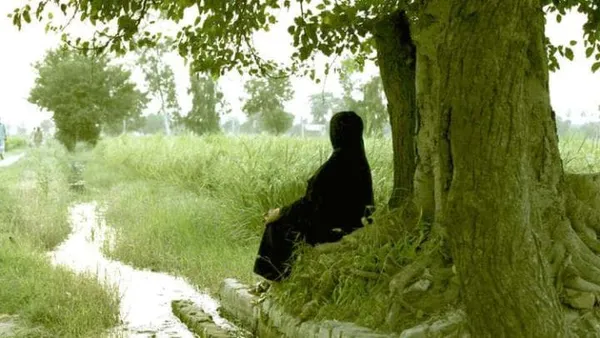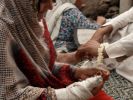Eye For Film >> Movies >> A Girl In The River: The Price Of Forgiveness (2015) Film Review
A Girl In The River: The Price Of Forgiveness
Reviewed by: Jennie Kermode

Sometimes when one talks about working with films, people are dismissive, thinking it's a trivial occupation - but well made films can trigger big changes in the world. A Girl In The River is one of those films. Made for HBO by Sharmeen Obaid-Chinoy, who won Pakistan's first ever Oscar for Saving Face in 2012 (and has been nominated again for this), it persuaded Prime Minister Nawaz Sharif to promise a crackdown on honour killings. Though it remains to be seen what this promise will mean in the long term, Obaid-Chinoy's film is certainly changing public attitudes and that could be what matters most.
At the heart of this story is Saba, who was just eighteen when she fell in love - conveniently, one might have thought - with the man whom her parents had arranged for her to be betrothed to. Unfortunately for her, they then changed their minds. On the advice of his family, she married him anyway. That same evening her relatives came for her, swore on the Qur'an that she would not be harmed, then drove her to a lonely place, beat her, shot her in the head, tied her up in a sack, threw it in the river and left her for dead.

More than a thousand women are murdered every year in Pakistan in attempts to preserve family honour. That Saba survived her ordeal is incredible. The police investigator who took on the case speaks of her with awe. But this is only part of her story. Patched up in hospital, left with a scar running from ear to lip and a damaged right hand, she was given shelter by her new in-laws - given, in fact, a whole new family, clearly loving and full of warmth. A lawyer stepped in, pro bono, to take on her case. But how should she proceed?
Every year, a high proportion of those women who survive this kind of attack go on to formally forgive their relatives, which essentially means that no punishment is levied at all - no prison time, not even a fine. Obaid-Chinoy's focus is on exploring the reasons why this happens. They're not all what you might think.
The effect of this system is that female lives are effectively devalued, especially in relation to the concerns of their male relatives. It contributes to attitudes that extend across many other aspects of life, and which Saba's father, who says he's proud of what he did, hopes will persist for generations. He makes it clear that he doesn't see why women who are adequately fed should need to go outside the house, and he's dismissive of the wishes of Saba's mother: "i am her husband and she is only my wife." He's more respected now because of what he did, he says, parading his shame before the world.
The blight of honour killing extends far beyond Pakistan. One hopes that this film will attract a wide audience.
Editor's note: If you live in the UK and are concerned that you or someone close to you may be at risk of honour based violence, you can contact Karma Nirvana for confidential support and advice.
Reviewed on: 08 Feb 2016















